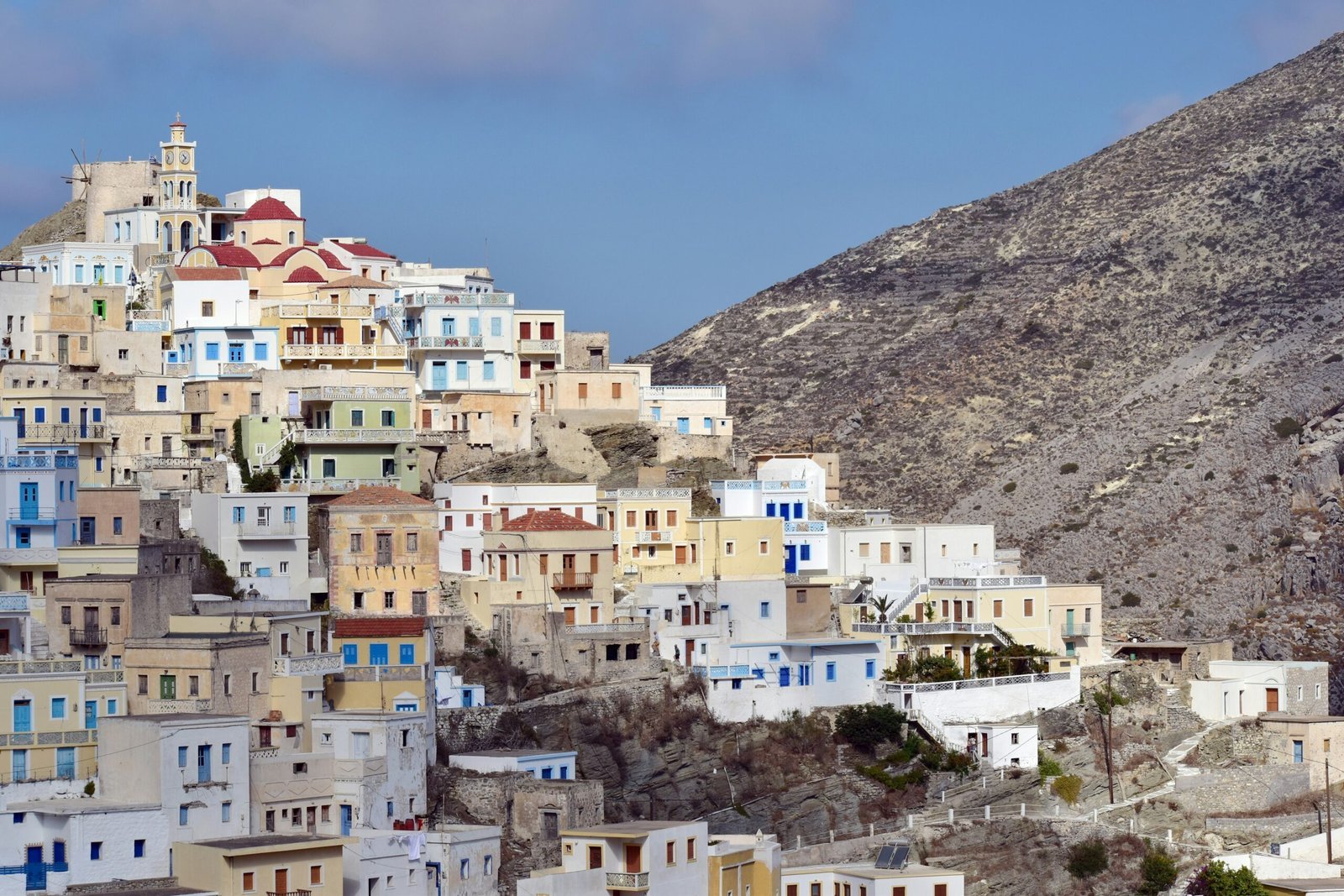
Introduction to November Weather in Greece
November in Greece signifies the shift from autumn to winter, introducing cooler temperatures and increased rainfall. Despite the seasonal change, the weather in Greece for November remains relatively mild, particularly when compared to many other European countries. This unique climate makes Greece an appealing destination for travelers who prefer to avoid the summer crowds while still enjoying pleasant weather.
During November, average temperatures across Greece typically range from 10°C to 18°C (50°F to 64°F). In northern regions like Thessaloniki, temperatures can drop to around 10°C (50°F), with occasional colder spells. Conversely, southern areas, including Athens and the Peloponnese, experience milder conditions, with temperatures often reaching up to 18°C (64°F). The Greek islands, such as Crete and the Cyclades, enjoy even warmer temperatures, making them ideal for those seeking a slightly warmer getaway.
Precipitation levels increase in November, with rainfall becoming more frequent. Northern Greece sees more substantial rainfall compared to the south. Thessaloniki, for instance, averages around 60mm of rain throughout the month. Southern regions and islands, while also experiencing increased precipitation, generally have fewer rainy days, allowing for more outdoor activities and exploration.
Daylight hours decrease as winter approaches, with November offering approximately 9 to 10 hours of daylight. This reduction in sunlight is more pronounced in northern Greece, where the days are shorter compared to the southern regions and islands. However, the relatively mild weather and ample daylight still provide ample opportunity for sightseeing and enjoying outdoor activities.
Regional variations in the weather are notable across Greece during November. The northern regions experience cooler and wetter conditions, while the southern areas and islands benefit from milder temperatures and less frequent rainfall. These climatic differences offer travelers a range of options, whether they prefer the crisp air of the north or the warmer, more temperate climate of the south and the islands.
Athens: A Blend of Culture and Mild Weather
November in Athens offers a pleasant climate, making it an excellent time for cultural exploration. The weather in Greece for November is typically mild in the capital, with average daytime temperatures ranging between 13°C (55°F) and 18°C (64°F). Rainfall is relatively infrequent, allowing visitors to comfortably enjoy the city’s rich historical and cultural sites without the sweltering heat of summer or the crowds of peak tourist seasons.
Athens is renowned for its ancient landmarks, and a visit to the Acropolis is a must. This UNESCO World Heritage site, perched on a hill, provides not only a deep dive into ancient Greek history but also breathtaking views of the city. The Parthenon, an iconic symbol of ancient Greece, is located here and is a marvel of classical architecture. Nearby, the Acropolis Museum offers a modern space to admire artifacts recovered from the site.
For those interested in a wider array of historical artifacts, the National Archaeological Museum houses an extensive collection of Greek antiquities, providing a comprehensive overview of Greece’s past. Another must-visit area is Plaka, known as the “Neighborhood of the Gods.” This charming district, with its narrow streets and neoclassical architecture, is perfect for leisurely strolls, shopping for souvenirs, and enjoying local cuisine.
Outdoor enthusiasts will find November’s mild weather ideal for activities such as hiking up Lycabettus Hill. Reaching the summit, either by foot or via the funicular railway, rewards visitors with panoramic views of Athens and the Aegean Sea. The hill is also home to the charming Chapel of St. George, a beautiful spot for photography and reflection.
In conclusion, Athens in November combines favorable weather conditions with a rich cultural tapestry, making it a perfect destination for travelers looking to explore the historic and vibrant heart of Greece. Whether you’re wandering through ancient ruins or hiking scenic hills, the city’s mild climate and wealth of attractions ensure a memorable visit.
Crete: An Island Escape with Warm Breezes
Crete, Greece’s largest island, serves as an appealing destination for travelers seeking milder weather in November. While the mainland experiences cooler temperatures, Crete’s coastal areas maintain a more pleasant climate, often featuring temperatures ranging from 15 to 20 degrees Celsius (59 to 68 degrees Fahrenheit). This makes it an ideal escape for those looking to enjoy Greece’s natural beauty without the summer crowds.
One of the top destinations on the island is Heraklion, the capital city, which offers a blend of historical and modern attractions. Visitors can explore the renowned Knossos Palace, the largest Bronze Age archaeological site on Crete, or meander through the Heraklion Archaeological Museum, which houses impressive Minoan artifacts. The mild weather in Crete for November ensures that these outdoor activities are comfortable and enjoyable.
Chania, another must-visit location, is known for its stunning Venetian harbor, charming old town, and picturesque lighthouses. The pleasant November climate allows for leisurely walks along the harbor and relaxed afternoons in waterfront cafes. Additionally, Chania offers easy access to the Samaria Gorge, one of Europe’s longest gorges, perfect for hiking enthusiasts seeking adventure amidst awe-inspiring natural scenery.
Rethymno, with its well-preserved medieval architecture and vibrant cultural scene, also stands out as a prime destination. The weather in Crete for November means fewer tourists, providing a more intimate experience when wandering through the narrow streets of the old town or visiting the Fortezza, a Venetian fortress with panoramic views of the sea.
For those in search of tranquility, Crete’s beaches are less crowded in November, offering serene spots for relaxation. Elafonissi Beach, with its pink sand and clear waters, and Balos Lagoon, known for its striking turquoise hues, remain picturesque and inviting even as the temperatures dip slightly compared to the summer months.
Overall, Crete’s warmer climate in November, combined with its rich history, diverse landscapes, and inviting coastal towns, makes it a compelling destination for travelers seeking both adventure and relaxation.
Thessaloniki, situated in northern Greece, experiences a distinct shift in weather during November. The temperatures tend to range between 10°C (50°F) and 18°C (64°F), accompanied by increased chances of rain. This cooler and wetter weather in Greece for November should not deter visitors, as Thessaloniki’s historical and gastronomical allure remains ever-present.
The city’s rich history is encapsulated in landmarks such as the White Tower, an iconic structure that offers panoramic views of the Thermaic Gulf. Another must-visit is the Rotunda, initially built as a mausoleum for Emperor Galerius and later converted into a Christian church. The Archaeological Museum of Thessaloniki is also a treasure trove of artifacts that narrate the region’s storied past, from the Archaic to the Roman period.
Despite the cooler weather, Thessaloniki’s vibrant culinary scene provides warmth and comfort. The city is renowned for its diverse array of local foods, from the savory delight of ‘bougatsa’ to the hearty ‘gyros’. November also brings the ‘Thessaloniki International Film Festival’, an event that attracts cinephiles from around the globe and adds a cultural vibrancy to the city.
Visitors are encouraged to explore the bustling ‘Modiano Market’, where one can sample fresh produce and traditional Greek delicacies. Additionally, Thessaloniki’s numerous ‘tavernas’ and ‘ouzeries’ offer a cozy atmosphere to enjoy ‘meze’ and ‘tsipouro’, perfect for those chilly November evenings.
Overall, while the weather in Greece for November might be cooler and wetter in Thessaloniki, the city’s historical sites, culinary delights, and cultural events make it a captivating destination worth exploring during this time of year.
Santorini: Off-Season Charm and Scenic Views
November in Santorini offers a unique blend of tranquility and natural beauty, making it an ideal time to explore this iconic Greek island. The weather in Greece for November, especially in Santorini, is characterized by cooler temperatures, averaging between 15°C (59°F) and 20°C (68°F). This milder climate provides a refreshing contrast to the intense summer heat, enabling visitors to comfortably engage in outdoor activities.
The reduced tourist crowds during this off-season period add to the island’s serene atmosphere. With fewer visitors, travelers can enjoy a more intimate experience at popular sites and attractions. One highly recommended activity is taking a wine tasting tour. Santorini’s volcanic soil produces some of Greece’s finest wines, and exploring the local wineries offers both a delightful and educational experience.
Another must-do activity is visiting the island’s unique volcanic beaches. The black sand beaches of Kamari and Perissa, along with the famous Red Beach, present a striking landscape that is perfect for photography and leisurely walks. These beaches are less crowded in November, providing a more peaceful environment to enjoy their natural beauty.
For history enthusiasts, the archaeological site of Akrotiri is a fascinating destination. Often referred to as the “Pompeii of the Aegean,” Akrotiri is an ancient Minoan city preserved under volcanic ash. Exploring this site offers a glimpse into the island’s rich historical past and its significance in ancient times.
Lastly, capturing Santorini’s iconic caldera views is an unforgettable experience. Some of the best viewpoints include Oia, Fira, and Imerovigli. These spots offer panoramic vistas of the caldera, especially at sunset, when the sky transforms into a palette of vibrant colors. November’s clear skies and reduced haze enhance the visibility, making this a perfect time for photography enthusiasts to capture stunning images.
Peloponnese: Historical Sites and Natural Beauty
The Peloponnese peninsula, a treasure trove of historical significance and natural splendor, is an excellent destination to explore in November. The weather in Peloponnese during this month is generally mild, with temperatures ranging from 12°C to 18°C (54°F to 64°F). Though November can bring occasional rain, it does not typically deter visitors from enjoying the region’s many attractions. The climate, while cooler than the summer months, is perfect for sightseeing and outdoor activities, making it an ideal time to explore without the bustling crowds of peak tourist season.
One of the primary draws of the Peloponnese is its rich historical landscape. Ancient sites such as Mycenae, Epidaurus, and Olympia offer a glimpse into Greece’s storied past. Mycenae, the legendary home of Agamemnon, features remarkable archaeological remains, including the famous Lion Gate and royal tombs. Epidaurus, renowned for its ancient theater, is a must-visit for those interested in classical Greek architecture and history. Meanwhile, Olympia, the birthplace of the Olympic Games, provides a fascinating tour of ancient athletic and religious practices.
Beyond its historical allure, the Peloponnese boasts stunning natural beauty. Nafplio, a charming coastal town, offers picturesque views and a relaxing ambiance perfect for a leisurely stroll along its seafront. The Mani Peninsula, with its rugged landscapes and traditional stone villages, is ideal for those seeking both adventure and tranquility. Hiking trails and scenic drives through the Taygetos mountains provide breathtaking vistas and a chance to experience the region’s diverse flora and fauna.
Practical tips for navigating the Peloponnese in November include dressing in layers to accommodate varying temperatures and packing waterproof gear for unexpected showers. Renting a car is advisable for greater flexibility in visiting remote sites and enjoying the scenic routes. Many attractions have reduced entry fees during the off-season, allowing for a more budget-friendly experience. Overall, the weather in Greece for November creates a favorable backdrop for discovering the historical and natural wonders of the Peloponnese.
Rhodes: Sunshine and Medieval Charm
Rhodes stands out as one of the sunniest regions in Greece, and even in November, it retains much of its warmth. Visitors can expect daytime temperatures to hover around a comfortable 20°C (68°F), with nighttime temperatures rarely dipping below 15°C (59°F). This makes Rhodes an attractive destination for those looking to escape the early winter chill found in other parts of Europe. The island receives around six hours of sunshine per day in November, providing ample opportunity for outdoor exploration.
One of the must-visit attractions in Rhodes is the medieval Old Town, a UNESCO World Heritage Site. This well-preserved area is a labyrinth of cobbled streets, historical buildings, and charming squares. The medieval walls and gates provide a glimpse into the island’s rich history, making it a delightful place to wander and discover. A visit to the Palace of the Grand Master is also highly recommended. This imposing structure offers insights into the island’s past as a stronghold of the Knights Hospitaller, with its grand halls and impressive architecture.
Another highlight is the Lindos Acropolis, perched on a hilltop with panoramic views of the surrounding coastline. The ancient ruins, including the Temple of Athena Lindia, are a testament to Greece’s classical heritage. The climb to the top is rewarding, offering both historical insights and breathtaking scenery.
Despite the cooler sea temperatures in November, usually around 20°C (68°F), the island’s beaches remain inviting for a stroll or relaxation. Popular beaches like Elli Beach and Tsambika Beach are less crowded during this time, providing a serene environment to enjoy the natural beauty. For those willing to brave the cooler waters, a quick dip can be refreshing.
Overall, the weather in Greece for November, particularly in Rhodes, offers a blend of pleasant temperatures and sunshine, making it an ideal destination for both historical exploration and beachside relaxation.
Tips for Traveling to Greece in November
Traveling to Greece in November can be a rewarding experience, given the mild weather and fewer tourists. However, preparing for the weather in Greece for November is crucial to ensure a pleasant journey. The weather can be variable, with temperatures ranging from 12°C to 18°C (54°F to 64°F) in many regions. Hence, packing layers is advisable. Bring a combination of lightweight clothing for warmer days and warmer layers, like sweaters and jackets, for cooler evenings and unpredictable weather shifts. An umbrella or a raincoat could also be useful due to occasional rainfall.
One significant advantage of visiting Greece in November is the off-season benefits. The reduced crowds mean you can explore popular destinations such as Athens, Santorini, and Crete without the usual hustle and bustle. Additionally, lower prices on flights and accommodations make it an economically favorable time to visit. This period also allows for a more intimate experience with local culture and traditions.
When planning your itinerary, consider attending local festivals and events that are unique to November. For instance, the Thessaloniki International Film Festival is a notable event that attracts cinema enthusiasts worldwide. Additionally, the Ohi Day celebrations on October 28th often extend into November, offering a glimpse into Greek patriotism and history through various parades and festivities.
Transportation options within Greece remain robust during November. Domestic flights and ferries operate regularly, although ferry services may be reduced compared to the peak summer months. Train and bus services continue to provide reliable means of exploring the mainland. Ensure to check the schedules in advance and consider potential delays due to weather changes or reduced frequency.
Lastly, always stay updated on any travel advisories or restrictions that may be in place. While Greece is generally welcoming to tourists year-round, weather in Greece for November can sometimes bring unexpected changes. Staying informed will help you navigate your trip smoothly and enjoy all that Greece has to offer during this serene and picturesque month.
FAQs on Weather in Greece for November
1. What is the weather like in Greece in November?
In November, Greece experiences mild to cool weather with temperatures varying depending on the region:
- Athens and Central Greece: Average temperatures range from 10°C (50°F) to 18°C (64°F). Rain is more frequent compared to the summer months.
- Greek Islands (e.g., Crete, Rhodes, Santorini): Temperatures range from 12°C (54°F) to 20°C (68°F). The islands are generally milder but can also be wet.
- Northern Greece (e.g., Thessaloniki): Cooler temperatures, ranging from 6°C (43°F) to 15°C (59°F), with a higher chance of rain and occasional fog.
2. Is November a good time to visit Greece?
November is considered the shoulder season, making it a good time to visit for those who prefer fewer crowds and lower prices. While the weather is cooler and wetter than in the peak summer months, it is still mild compared to many other parts of Europe.
3. What should I pack for a trip to Greece in November?
Pack layers to adapt to varying temperatures:
- Light sweaters and jackets for cooler evenings.
- Waterproof clothing or an umbrella due to the higher chance of rain.
- Comfortable walking shoes for exploring.
- Light clothing for warmer days, especially in southern regions and islands.
4. What are the best destinations to visit in Greece in November?
Some ideal destinations to consider visiting in Greece in November include:
- Athens: Enjoy the capital’s historical sites like the Acropolis, Parthenon, and museums with fewer tourists.
- Santorini: Although it’s cooler, the island’s beauty can still be enjoyed without the summer crowds. Some restaurants and hotels may be closed, but the experience is more tranquil.
- Crete: This large island offers diverse landscapes, historical sites like Knossos, and milder weather. Cities like Heraklion and Chania are great for cultural exploration.
- Peloponnese: Explore ancient sites like Mycenae, Epidaurus, and the city of Nafplio with pleasant weather.
- Thessaloniki: This vibrant northern city offers a mix of culture, history, and good food, though the weather is cooler.
5. Are there any festivals or events in Greece in November?
Yes, November has several cultural events and festivals:
- Ohi Day (October 28): Although technically in late October, celebrations often continue into November with parades and festivities.
- Feast of St. Andreas (November 30): Celebrated in parts of Greece, particularly in Patras, with religious ceremonies and local festivities.
- Thessaloniki International Film Festival: Held annually in November, it is one of the most important film festivals in Southeast Europe.
6. Are tourist attractions open in November?
Most major tourist attractions and historical sites remain open in November, though some may have reduced hours. Some seasonal businesses, especially on smaller islands, may close for the winter, so it’s best to check in advance.
7. Can I swim in the sea in November?
Swimming in November is generally not recommended as the sea temperatures are cooler, averaging around 18°C (64°F). However, for those who enjoy brisk swimming, some southern regions and islands might still be feasible.



